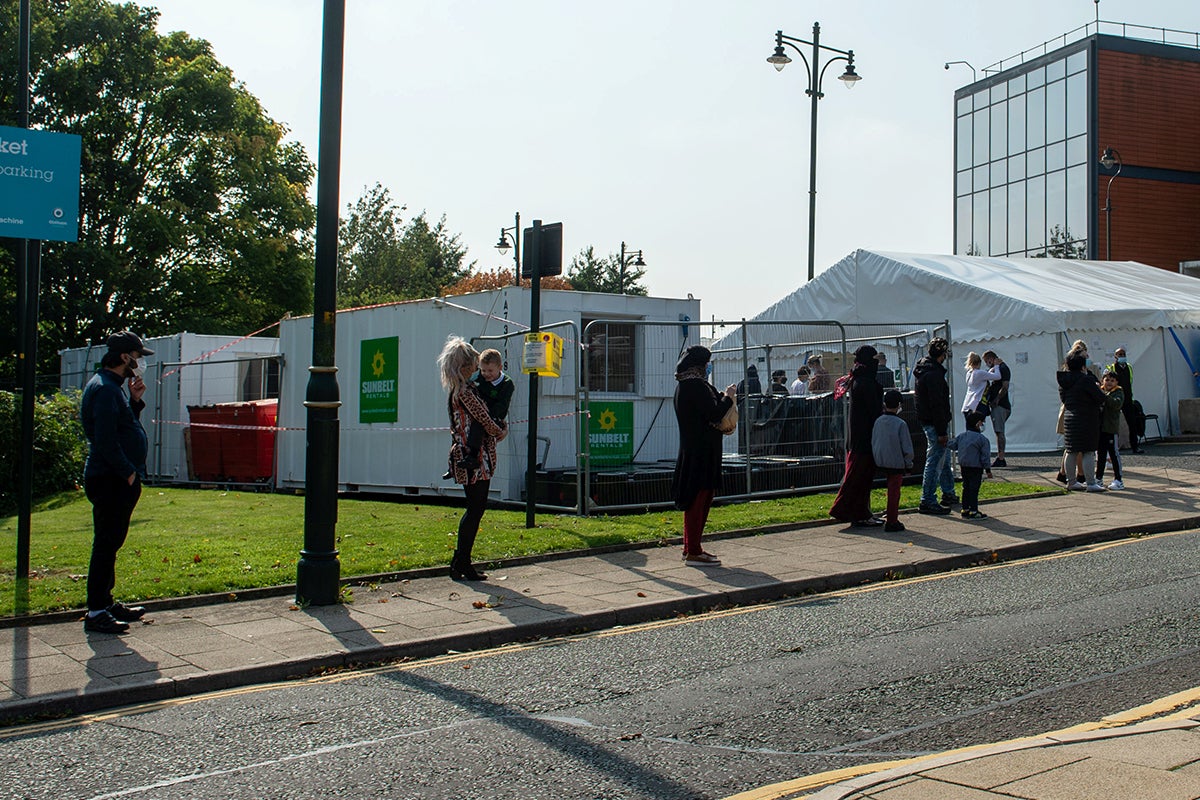Hospitals urge people wanting coronavirus tests not to go to A&E as national system threatens to collapse
Health bosses in Bolton, Leeds, Plymouth, Derby and Liverpool among those telling patients they must wait for slots at specialist centres – despite none being available

Your support helps us to tell the story
From reproductive rights to climate change to Big Tech, The Independent is on the ground when the story is developing. Whether it's investigating the financials of Elon Musk's pro-Trump PAC or producing our latest documentary, 'The A Word', which shines a light on the American women fighting for reproductive rights, we know how important it is to parse out the facts from the messaging.
At such a critical moment in US history, we need reporters on the ground. Your donation allows us to keep sending journalists to speak to both sides of the story.
The Independent is trusted by Americans across the entire political spectrum. And unlike many other quality news outlets, we choose not to lock Americans out of our reporting and analysis with paywalls. We believe quality journalism should be available to everyone, paid for by those who can afford it.
Your support makes all the difference.Hospitals across England are urging people not to turn up requesting coronavirus tests, as the government’s national testing system continues to fail to meet demand.
Health bosses in Bolton, Leeds, Plymouth, Derby and Liverpool have all told patients they must wait for slots at specialist centres or request home-testing kits, rather than arriving at A&E.
In one case, at the Royal Bolton Hospital, the trust’s medical director, Dr Francis Andrews, suggested that because the department was so overwhelmed, only people who had “experienced a life-threatening accident or illness” should attend – although the guidance was later widened to anyone with “urgent medical need”.
The pleas have come as the government’s national test and trace system threatens to collapse under the sheer weight of demand following a surge in infection rates.
Slots at government testing sites – run by a plethora of private companies, such as Serco – are now not available in some of the country’s worst-hit areas, including Bolton, Oldham, Preston, Blackburn and Liverpool.
The logjam has resulted in people turning up at hospital doors to request tests.
Speaking on Wednesday, Saffron Cordery, deputy chief executive of NHS Providers, said A&E departments could not provide the service – and those who went to hospital seeking a coronavirus test were putting others at risk.
She said: “Following the huge increase in demand for Covid-19 tests, trust leaders are concerned that current shortages are leading to an increasing number of people attending A&Es asking for a test.
“It’s clear there are severe capacity problems, but the public should still follow government guidance to apply for a test using the test and trace system.
“Anyone with coronavirus symptoms should seek to get a test either through a test site, or through a home-test kit.”
She added: “If you cannot get a test, it is important to keep self-isolating to help reduce the spread of the virus. We must not undo the progress which has been made, and risk overwhelming NHS services.”
In Leeds, where numbers turning up at A&E were said to be especially high, Dr Sarah Davey, a consultant in emergency medicine with the city’s NHS trust, said: “A&E staff arrange tests for people who are seriously ill or injured and who need to be admitted to hospital as an emergency, but we are not set up as a community testing centre.
“Our staff are specialists in emergency medicine; A&E does not have the right facilities to test people who have mild symptoms.”
Professor Donna Hall, chair of Bolton NHS Foundation Trust, told the BBC: "We had 100 people in our accident and emergency unit today, five ambulances queuing outside.
"This failure of the test and trace system is placing huge pressure on the NHS and social care."
She said the situation now is different to March when they had extra staff drafted in and were not expected to continue with planned operations.
The health secretary, Matt Hancock, has said the government is trying to resolve the issue, but it may yet go on for weeks.

Join our commenting forum
Join thought-provoking conversations, follow other Independent readers and see their replies
Comments